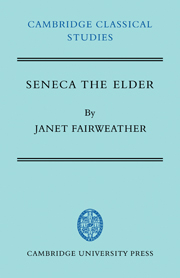Book contents
- Frontmatter
- Contents
- Preface
- Abbreviations
- PART I THE PLACE OF SENECA THE ELDER IN LITERARY HISTORY
- PART II SENECA THE ELDER ON THE HISTORY OF ELOQUENCE
- PART III FIVE ASPECTS OF DECLAMATION: THE ELDER SENECA'S EVIDENCE
- 1 Inventio
- 2 Dispositio
- 3 Elocutio
- 4 Memoria
- 5 Actio
- PART IV THE PLACE OF EARLY IMPERIAL DECLAMATION IN LITERARY HISTORY: THE ELDER SENECA'S EVIDENCE
- Indexes
- Frontmatter
- Contents
- Preface
- Abbreviations
- PART I THE PLACE OF SENECA THE ELDER IN LITERARY HISTORY
- PART II SENECA THE ELDER ON THE HISTORY OF ELOQUENCE
- PART III FIVE ASPECTS OF DECLAMATION: THE ELDER SENECA'S EVIDENCE
- 1 Inventio
- 2 Dispositio
- 3 Elocutio
- 4 Memoria
- 5 Actio
- PART IV THE PLACE OF EARLY IMPERIAL DECLAMATION IN LITERARY HISTORY: THE ELDER SENECA'S EVIDENCE
- Indexes
Summary
Pronuntiatio a plerisque actio dicitur, sed prius nomen a voce, sequens a gestu videtur accipere. namque actionem Cicero alias ‘quasi sermonem’, alias ‘eloquentiam quandam corporis’ dicit. idem tamen duas eius partis facit, quae sunt eaedem pronuntiationis, vocem atque motum: quapropter utraque appellatione indifferenter uti licet.
(Quint. XI.3.1)The standard view of rhetorical theorists was that actio, like memoria, was not wholly the product of the speaker's natural gifts (e.g. Quint. III.3.1), though in the elder Seneca's day Albucius, not without some support from earlier tradition, rejected the normal inclusion of actio among the five parts of orandi ratio (ibid. 4). The attitudes of Seneca and Latro towards this question seem closely comparable with those of Cicero and Quintilian. Seneca does not deny that prior exercitatio of a kind could be beneficial to the speaker's actio, but, in common with the theorists, he does not wish orators to sound like actors, and Porcius Latro is said to have rejected certain forms of vocal and physical exercise which we know from Cicero and Quintilian to have formed part of the training of actors and singers.
It was recognized to be an advantage for the declaimer to have, as Latro had, a naturally strong voice (robusta – Contr. I pr. 16), best of all one which combined strength with sweetness, such as Cassius Severus possessed, suavitas valentissimae vccis – quamvis haec inter se raro coeant, ut eadem vox et dulcis sit et solida (Contr. III pr. 3), but it was possible to be a successful declaimer without a perfect voice.
- Type
- Chapter
- Information
- Seneca the Elder , pp. 235 - 240Publisher: Cambridge University PressPrint publication year: 1981



